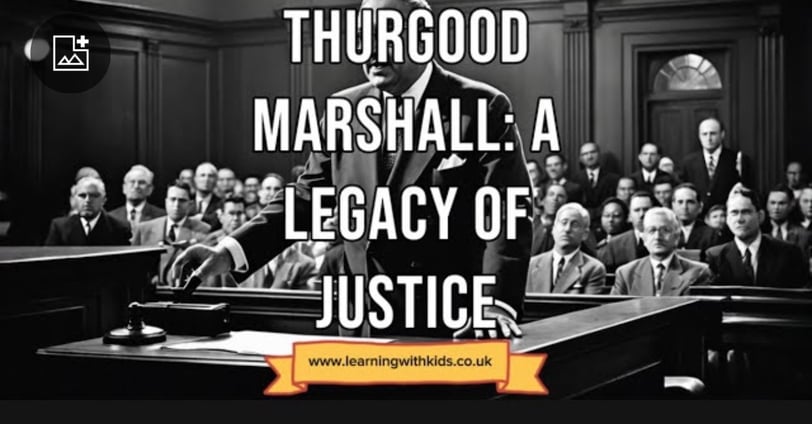From Defiance to Triumph with Thurgood Marshall
What fueled Thurgood Marshall's relentless pursuit of justice, despite facing rejection due to his race? Discover how this remarkable figure transformed personal setbacks into groundbreaking victories against systemic racism. Through the lens of his upbringing in Baltimore and his academic journey, we explore how his early courtroom experiences ignited a passion for law and justice. The episode uncovers how Marshall’s strategic brilliance, honed under the mentorship of Charles Hamilton Houston, laid the foundation for his role in dismantling segregation, one case at a time.
Footprints In The Dark
10/22/20242 min read


Thurgood Marshall's journey from rejection to revolution is a testament to his unyielding commitment to justice and equality. Despite facing rejection from the University of Maryland Law School solely due to his race, Marshall used this setback as a catalyst for change. This episode delves into his remarkable life, exploring how his early experiences and strategic brilliance transformed the American legal landscape.
Marshall's upbringing in Baltimore laid the foundation for his future endeavors. Born in 1908 to a railroad porter and a teacher, his family instilled in him a deep respect for hard work and education. His father often took him to courtrooms, igniting a passion for law that would define his career. Despite excelling academically and becoming a star debater, Marshall faced systemic racism firsthand when the University of Maryland rejected him. Instead of succumbing to bitterness, he channeled this rejection into a driving force, attending Howard University Law School and graduating at the top of his class.
Under the mentorship of Charles Hamilton Houston, a legal strategist of immense repute, Marshall honed his skills and adopted a calculated approach to dismantling segregation. This mentorship was pivotal, teaching him the importance of strategically choosing battles to chip away at the system of segregation case by case. The Marie V. Pearson case in 1936 was a turning point, where Marshall successfully challenged the University of Maryland, forcing them to admit a black student. This victory was more than personal; it demonstrated the potential to challenge and defeat segregation.
Marshall's fight against segregation took on monumental significance with the infamous Plessy v. Ferguson decision of 1896, which legalized segregation under the "separate but equal" doctrine. Marshall recognized that a direct assault on this deeply ingrained precedent was impractical. Instead, he adopted a long-game strategy, meticulously targeting cases where the "separate but equal" facade crumbled under scrutiny. His efforts culminated in the landmark Brown v. Board of Education case, which struck down the "separate but equal" doctrine in public education, marking a seismic shift in the fight for racial equality.
The episode further explores Marshall's tenure as the first African-American Solicitor General and his subsequent appointment to the Supreme Court. As Solicitor General, Marshall represented the United States in front of the Supreme Court, winning 14 out of 19 cases, a testament to his unparalleled legal acumen. His appointment to the Supreme Court in 1967 was not just historic but also a recognition of his lifelong dedication to equality and justice.
Marshall's legacy as a Supreme Court Justice is characterized by his unwavering defense of individual rights and his commitment to providing real opportunities for the marginalized and oppressed. He was a staunch advocate for affirmative action and consistently opposed the death penalty, highlighting its inherent flaws and injustices. His powerful dissents, especially as the court became more conservative, served as a roadmap for future legal battles, underscoring his belief that the law is dynamic and ever-evolving.
In summation, Thurgood Marshall's life and work serve as a powerful reminder of the impact one individual can have in the fight for civil rights. His legacy is not only visible in the courthouses and schools bearing his name but also in the countless lives he touched and the belief in equality he ignited. This episode is a call to action, urging us to continue the fight for justice and equality that Marshall so passionately championed.
